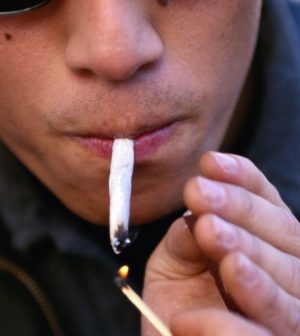- Could Your Grocery Store Meat Be Causing Recurring UTIs?
- Are You Making This Expensive Thermostat Error This Winter?
- Recognizing the Signs of Hypothyroidism
- 10 Strategies to Overcome Insomnia
- Could Artificial Sweeteners Be Aging the Brain Faster?
- Techniques for Soothing Your Nervous System
- Does the Water in Your House Smell Funny? Here’s Why
- Can a Daily Dose of Apple Cider Vinegar Actually Aid Weight Loss?
- 6 Health Beverages That Can Actually Spike Your Blood Sugar
- Treatment Options for Social Anxiety Disorder
Abusing Pot, Booze Lowers Teens’ Chances for Success in Life

The American dream of success is a lot harder to attain for teenagers who use pot and alcohol, especially if they become substance abusers, a new study reports.
Teen pot smokers and drinkers struggle to achieve some of the hallmarks of adult success, including obtaining a college degree, getting married, holding down a full-time job and earning a good living, the researchers found.
“Parents should try to delay their children’s onset of use as much as possible,” said research supervisor Victor Hesselbrock, chairman of addiction studies at the University of Connecticut. “If you can push regular use back well into adolescence, the kids do a lot better.”
The researchers have been tracking the life course of 1,165 young adults from across the United States, most of whom come from a family with a history of alcoholism, Hesselbrock said.
Participants’ habits were first assessed at age 12. After that, the researchers checked in on them at two-year intervals, up through age 25 to 34 for many of the subjects.
Kids from families with alcohol abuse followed patterns of first substance use and frequency of use that are typical of U.S. high school kids, Hesselbrock said.
But as they got older, the paths of those who used or became dependent on alcohol or pot as teens deviated from those of kids who stayed clean for the most part, according to lead researcher Dr. Elizabeth Harari, who did the analysis as part of her residency training at the University of Connecticut.
Teens addicted to any substance were less likely to achieve any of the life goals she assessed. Fewer got married, went on to get a college degree, found a full-time job or earned a good salary.
Even those teens who only used pot and alcohol without forming a habit wound up achieving less in their lives.
Male users had a harder time finding a full-time job and earning good pay, while female users were less likely to get a college degree.
Harari presented the findings Sunday at the American Public Health Association’s annual meeting, in Atlanta.
“As America continues this momentum towards legalization of cannabis, results like these should serve as important speed bumps to remind us cannabis is not a harmless product,” said Dr. Timothy Brennan, an attending physician with The Addiction Institute at the Icahn School of Medicine at Mount Sinai in New York City. “When combined with alcohol, it can be quite problematic for people’s lives.”
Because the study tracked kids over time, it provides solid evidence that substance use predates problems in achieving success later in life, Hesselbrock said.
“I really think it is the substance use that is causing them the difficulty,” he said, although the study did not prove a cause-and-effect link.
Dr. Michael Ketteringham, medical director of integrated medicine and psychiatry with Staten Island University Hospital in New York City, said this sort of study probably won’t stem the tide of marijuana legalization in America.
“Such measures are supported by the majority of Americans, and the imprisonment of people caught in possession of cannabis can be considered to be at crisis levels in the United States, resulting in the disruption of families and other outcomes that are associated with having a criminal history,” Ketteringham said.
He added, however, that the easing of criminal penalties should not be considered evidence that adolescent cannabis use doesn’t do harm.
“The association of cannabis use with multiple deleterious outcomes as an adolescent reaches adulthood suggests that as the drug becomes less criminalized, other public health measures must focus on limiting the use of cannabis by the most vulnerable, adolescents,” Ketteringham said.
Hesselbrock recommends that parents start talking about substance use with their kids at an early age.
“You don’t start talking to your kids about alcohol and drugs when they’re 13, 14, 15 and probably have already initiated that and other types of high-risk behaviors,” he said. “I would say start taking with your kids even beginning at age 6 or 7, then as they approach those danger years of 11 and 12 for girls, probably 12 to 14 for boys, sit down and have the talk. You can’t have an in-depth conversation because they don’t have that experience, but it should be a recurring theme and seizing of opportunities when it seems appropriate.”
Parents can use recent events as life lessons for kids — for example, pointing out when alcohol or drugs has caused a car wreck, a fight, a lost job or problems at school for family, friends and acquaintances, Hesselbrock said.
Research presented at meetings is typically considered preliminary, because it has not been subjected to peer review.
More information
For about teen substance use, visit the U.S. Department of Health and Human Services.
Source: HealthDay
Copyright © 2026 HealthDay. All rights reserved.










